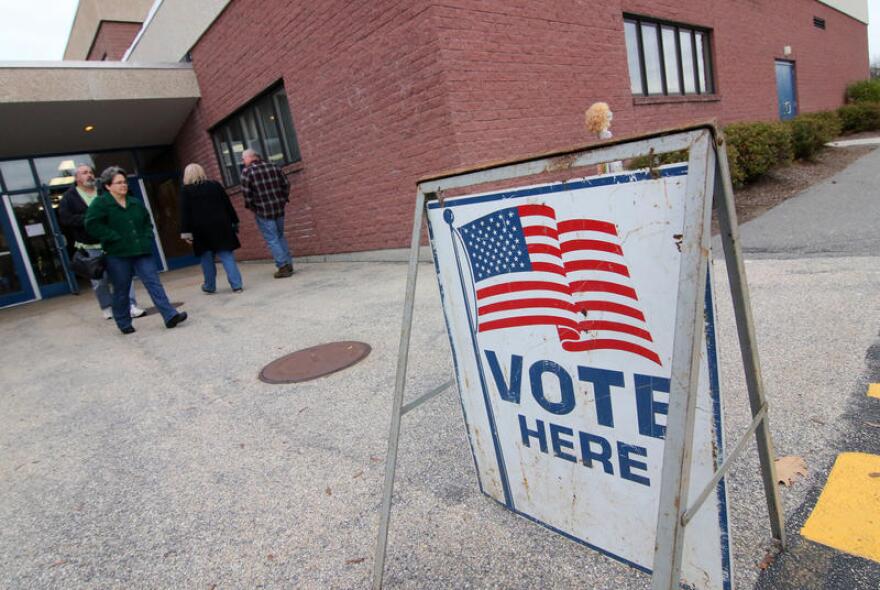If you’ve been paying attention to the news in the past few days, you’ve probably heard the President and a top adviser claim (without evidence) that out-of-state voters bused into New Hampshire were to blame for Trump’s loss here in November.
To be clear: New Hampshire election officials have repeatedly said they have no reason to believe this is the case.
“We are not aware of any evidence to support a claim that busloads of out of state residents come to New Hampshire to vote illegally,” Deputy Secretary of State Dave Scanlan said Monday. “Perceptions are important, and the concern with these repeated statements from the current administration is the image citizens from other states may have of the elections conducted in New Hampshire.”

When Trump made similar claims back in November, Scanlan invited the president to pass along proof of those allegations in case they needed to be investigated. Scanlan said his office stands by its previous statements. Gov. Chris Sununu, speaking on NHPR’s The Exchange Monday, said he, too, has asked the Trump administration for details on any incidents that might be cause for concern.
In the absence of proof of widespread voter fraud like the kind Trump and his allies have alleged, you might still be wondering: What does it take to register to vote on Election Day in New Hampshire, and what processes are in place to verify someone’s legally eligible to vote here?
In short, if you were trying to register to vote in New Hampshire on Election Day, you would have to:
- Show up to a New Hampshire polling place.
- Request a voter registration form.
- Provide proof of age, identity, citizenship and domicile. (*Or sign an affidavit affirming that you are who you say you are, and you live where you are trying to vote.)
- Receive your ballot.
- Cast your vote.
(*If you signed an affidavit, the state will mail a letter to the address you listed on there after the election. If that letter is undeliverable or ignored, your case gets forwarded to the attorney general’s office for further review.)
There are ways for you to register and vote in New Hampshire on Election Day, even if you don’t have a New Hampshire photo ID or proof that you’re living there on the day of the election. But if you’re going to do that, you have to sign a legal document confirming that you’re telling the truth about who you are and where you live – and if you lie about that, you’re opening yourself up to the possibility that you could be prosecuted.
But, because it’s a little more complicated than that in practice, here’s an overview of how the above process is supposed to play out.
What are the basic requirements for registering to vote in New Hampshire?
To vote in New Hampshire, you must prove your age, identity, citizenship and domicile.
Right now, as explained by the Secretary of State’s website, “there is no minimum period of time you are required to have lived in the state before being allowed to register.” But prospective voters are supposed to provide some confirmation that New Hampshire is “that one place where a person, more than any other place, has established a physical presence and manifests an intent to maintain a single continuous presence for domestic, social, and civil purposes relevant to participating in democratic self-government.”
How does someone prove that they meet those requirements if they just show up on Election Day?
The simplest way is to present a New Hampshire driver’s license or non-driver ID card – which verifies your age, identity (with photo) and your current address, if you live in the precinct where you’re registering to vote. If your current address is different from the one listed on your ID, you’re supposed to provide other proof that you live where you’re trying to vote.
But say you don't have a New Hampshire driver's license or state-issued ID card?
You can still register to vote – if you have other documents to prove your identity and domicile.
Election officials accept lots of different types of documents to meet the requirements for a photo ID, including: driver’s licenses or non-driver ID cards from other states, armed services ID cards, passports or New Hampshire student photo ID cards. If a local moderator, clerk or supervisor of the checklist can verify a voter’s identity on their own, that also works.
Election officials also accept lots of different documents to prove that someone is domiciled in the place where they’re trying to vote. In Manchester, election officials tell people they can present a valid New Hampshire vehicle registration, a utility bill or other monthly bill (with the voter’s name on it), medical bills, pay stubs showing a current address or postmarked mail within the last 30 days. (Other communities, including Barrington and Dover, offer similar guidance on what documents election officials will accept.)
You don’t have to offer all of the above documentation, just enough to provide enough evidence to local election officials that you are who you say you are and you are currently domiciled in New Hampshire, even if you don’t have a permanent address here.
So, for example: If someone has an out-of-state driver’s license (showing their age and identity) and a piece of postmarked mail sent to them at an address in the ward where they’re registering to vote (offered as proof of domicile), that would likely satisfy the requirements to register.
What if someone doesn't have all of the required forms of documentation?
You can still register to vote – if you sign an affidavit swearing that you are who you say you are or you live in the place where you’re trying to vote.
If someone’s registering to vote for the first time, and they don’t have all of the documents they need to prove their age, identity or domicile, they can fill out a “Qualified Voter Affidavit.” By signing that form, the voter affirms “that I am the identical person whom I represent myself to be, that I am a duly qualified voter of this town (or ward), that I am a United States citizen, that I am at least 18 years of age as of this date or will be at the next election, and that to the best of my knowledge and belief the above information [filled out on the affidavit] is true and correct.” The form also makes it clear that, if you lie about those qualifications, you could face up a fine of up to $5,000 and one year in jail.
Prospective voters who don’t have proof of their domicile but have other forms of identification can also sign a “Domicile Affidavit,” which requires them to: list a local address, confirm that it’s a place they intend to return to “upon temporary absence,” and confirm that they are not domiciled anywhere else.
(If someone’s already registered to vote and doesn’t have the right kind of ID, they also have the option to fill out a “Challenged Voter Affidavit” in order to get a ballot.)
If a voter signs one of those affidavits, they get to take a ballot and cast their vote, just like everyone else.
Do state officials follow up on those affidavits to make sure someone is who they say they are and lives where they voted?
They try to. Within 90 days of the election, the Secretary of State’s office is required to mail letters to anyone who filled out an affidavit in order to vote, using the address listed on their affidavit. (The letters are labeled with instructions that they are not supposed to be forwarded, in case someone set up mail forwarding.)
If the mail comes back as undeliverable or the voter doesn’t respond with a valid confirmation, those cases get forwarded to the attorney general’s office for further investigation. (That said: The attorney general’s office only has one part-time attorney working on election-related investigations, and the agency has made no secret about the fact that they are running behind on investigating all kinds of election law complaints, not just voter eligibility cases.)
How common is it for someone to vote in New Hampshire without presenting all of the required documentation?
Less than 0.2 percent of voters in the November elections did not have an acceptable form of identification, according to Deputy Secretary of State Dave Scanlan.
The Secretary of State’s office compiles a report on how many affidavits are mailed out to people who cast ballots in New Hampshire elections. For elections that took place between May and December 2016 (which includes the state primary and the general election), the Secretary of State mailed letters to 764 people who registered to vote without photo ID and 6,033 people who voted without proving their domicile.
Right now, we don’t yet know how many of those have been forwarded to the attorney general’s office for further investigation.








